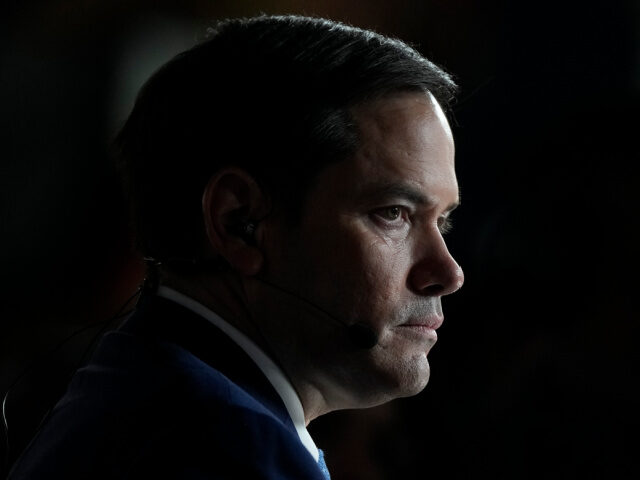As a United States senator for over a decade, President-elect Donald Trump’s choice for secretary of state, Sen. Marco Rubio (R-FL), dedicated much of his effort to fighting the interests of repressive communist and socialist states, resulting in the Chinese Communist Party banning him from the country and an alleged assassination plot by the Venezuelan regime.
Trump announced on Thursday that he had chosen his one-time presidential rival and ally in the 2024 election cycle to run the State Department on Thursday, praising him as “a Highly Respected Leader, and a very powerful Voice for Freedom.”
“He will be a strong Advocate for our Nation, a true friend to our Allies, and a fearless Warrior who will never back down to our adversaries. I look forward to working with Marco to Make America, and the World, Safe and Great Again!” Trump said in a statement to the press.
In Congress, Sen. Rubio prioritized America’s foreign policy threats and global human rights crises, drafting legislation to address China’s ongoing genocide of Uyghur and other non-Han ethnic groups in East Turkistan and encouraging Washington to more directly address the threat of Iran-allied socialist Venezuela. His positions have made him a pariah in some of the world’s most anti-American capitals – most notably in Beijing, which he is banned from legally visiting.
In 2020, the Chinese Communist Party sanctioned Rubio – along with fellow Cuban American Sen. Ted Cruz (R-TX) and nine others – in 2020, allegedly in response for sanctions on Chinese officials involved in the Uyghur genocide during Trump’s first term. The Chinese government further sanctioned Rubio for his vocal support of anti-communist protests in Hong Kong, which erupted in 2019 and were violently crushed and ultimately silenced by Wuhan coronavirus lockdowns and the passage of an illegitimate “national security” law out of Beijing.
“Last month #China banned me. Today they sanctioned me. I don’t want to be paranoid but I am starting to think they don’t like me,” Rubio joked on Twitter shortly after the sanctions passed..
The Hong Kong-based South China Morning Post noted on Tuesday, before Rubio’s nomination was official, that nominating a candidate for secretary of state actively sanctioned by China would be unprecedented and potentially complicate attempts to improve relations with the Communist Party on the terms that Beijing would prefer. The outlet quoted a Chinese academic who lamented that Rubio could “create chaos” by not conforming to the Chinese regime’s demands.
“We are very concerned about [the potential impact on] bilateral relations looking ahead,” the academic, Zhu Feng of Nanjing University, said.
The Chinese Foreign Ministry did not address the nomination on Thursday, nor has China commented on potentially lifting sanctions on Rubio to allow for normalized diplomacy with the Trump administration. China’s state-run Xinhua News Agency reported that Rubio was nominated for the secretary of state role but added no meaningful commentary on the choice, instead discussing potential replacements in the Senate.
Other rogue regimes that Rubio has actively confronted have also remained silent. At press time, VTV, the official news agency of the Venezuelan socialist regime, has not mentioned the nomination. Dictator Nicolás Maduro and his henchmen have for years condemned Rubio’s support of the anti-socialist opposition in the country and his condemnation of Maduro’s human rights abuses. In 2017, the Miami Herald reported that the Department of Homeland Security circulated a memo announcing that Diosdado Cabello, one of Maduro’s top henchmen, issued an “order to have Senator Rubio assassinated.” Cabello, one of the heads of Maduro’s United Socialist Party of Venezuela (PSUV), has long been suspected to be the head of the Cartel of the Suns, a cocaine-trafficking operation run through the Venezuelan military.
“There are also very strong allegations made by some people about the role of Diosdado Cabello, an individual who, in my perspective, based on everything I have seen, is not simply a drug-trafficking leader,” Rubio denounced that year. “In my opinion, he is the Pablo Escobar of Venezuela.”
While Venezuela has remained silent on the nomination, the Communist Party of Cuba, through its official newspaper Granma, published a panicked condemnation of Rubio on Tuesday. As a member of the Cuban exile community, Rubio has been a loud supporter of human rights sanctions on the Castro regime and other policy measures to contain the malignant influence of the Castro regime on the hemisphere.
“If he is confirmed, the peoples of Latin America can expect nothing good,” Granma declared dramatically. “Giving such political reach to a shadowy figure, that has caused so much damage, is a bad omen for the world,” the outlet said, adding that “the Florida Senator, beyond being a hardliner, is committed to the worst causes on this planet.”
Beyond condemning Cuba’s human rights atrocities against its own people, Rubio has for years warned that China was leveraging its alliance with Cuba to hurt the United States.
“Russia and China, as we know, are opportunistic serial human rights abusers. So they have no qualms about supporting dictators anywhere in the world,” Rubio detailed in 2018. “Both nations have been willing and able partners to some of the worst human rights abusers in the region. They prop up the [Raúl] Castro and Maduro regimes in Cuba and Venezuela. … In Nicaragua, the Chinese are working on a shipping lane that could dwarf the Panama Canal potentially bringing new revenue, new power to a repressive [Daniel] Ortega regime.”

COMMENTS
Please let us know if you're having issues with commenting.